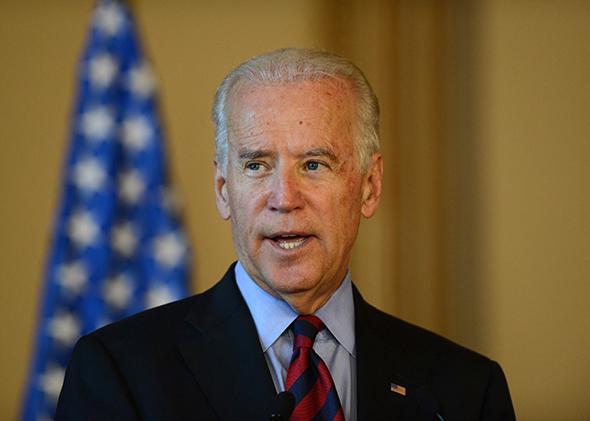On Monday morning, at a White House summit on policies to help working families, Vice President Joe Biden reflected on his wealth. He said that while he wore a “mildly expensive suit” and was vice president of the United States of America, he didn’t own a stock or a bond, and as a senator, was the poorest member of the club. This bit is a longstanding part of Biden’s shtick, but was interpreted—most loudly by the Republican National Committee—as a dig at possible presidential rival Hillary Clinton. The former secretary of state has been having trouble talking about her considerable wealth, ever since she described herself as “dead broke” upon leaving the White House.
It’s hard to know what motivates Biden to zoom down a rhetorical byway. His comments on Monday were particularly strange, given that the vice president’s disclosure statements show that he does have a stock portfolio, though it is owned by his wife. But even if that’s the case, Biden probably couldn’t help himself. The poor-man routine is a political trope, the same one that tripped up Clinton on the first leg of her book-promotion tour. Politicians find it so irresistible because it can be effective.
Politicians can’t help trying to connect. Tell them your hometown, and they’ll have a story and a relative from there. In a time of economic woe, they will try to show you that they have some connection to the most fundamental forces in a voter’s world.
The connection is powerful because it suggests to voters that the politician is going to work to address their problems. But candidates also try to make this connection because it’s one of the vital pathways to a voter’s heart. If you show voters that you have some understanding of their economic condition, they’ll listen to you. Or, better yet, they’ll support you without much further investigation.
Voters “fill in political characteristics from the personal,” says Lynn Vavreck, political science professor at UCLA. “They take an inference. They’re not making it up, but they’re not doing research either. They’re using a lot of cues and shortcuts from their daily lives to come to a judgment.” That is why politicians kiss babies, drink boilermakers, go bowling, duck hunting, and otherwise engage in all kinds of gymnastics and pantomimes that have little to do with the office they’re trying to hold.
Vavreck cites the work of political scientist Samuel Popkin whose 1991 book The Reasoning Voter studied “low-information rationality,” the gut level way in which voters read candidates. When voters don’t have much information and aren’t inclined to do lots of the extra work researching the candidates, they pick information that’s most available and cue off of that. That’s why candidates are always mentioning that they have “Iowa values,” or “Ohio values,” says Vavreck, because “that’s a way to signal that I’m just like you.” Sometimes that’s enough to make a lasting first impression.
If you can show voters you understand their condition, or have experienced something similar, then you’ve made a potentially powerful connection. They may not know what carbon sequestration is, but their economic circumstances are vital to them. Voters who make that brief connection will be more willing to trust you as a candidate even if it’s on issues that have nothing to do with the economic issues on which that connection was based. “It’s a big canister you can throw a whole bunch of stuff in,” says Vavreck.
While an economic connection can be potent, it can be easily broken. Mitt Romney talked about owning American cars—but that led to him talking about how many his wife had. He talked about liking NASCAR, but then mentioned that he knew a lot of NASCAR team owners. When President Obama picked the high price of arugula at Whole Foods as his example of the discrepancy between what supermarkets charge and what farmers get paid, he probably didn’t make inroads with his audience of rural voters in Iowa which did not have the upscale chain.*
Biden and Clinton are courting danger when they embroider their hard times. Dislike of phonies is a gut instinct, too. Clinton had just bought $2 million homes and signed an $8 million book contract at the time she said she was “dead broke.” Though Biden may not be as wealthy as others in his cohort, he is obviously set for life and as a long-serving senator was always on a far easier track than a struggling middle-class family. More than Hillary, though, the vice president has known personal struggle that any hard-pressed American would recognize. His wife and child were killed in a car accident in 1972 while Christmas shopping.
Fellow feeling is also not the only thing voters take into account. Liberals have long wondered why voters have put social issues above economic ones in certain parts of the country. As Vavreck points out, Rep. Paul Ryan had a compelling story of his family’s struggles after his father died, but that story competes with his promotion of a budget plan that shreds social safety nets and leads even some in his party not to support it. John Edwards, Tim Pawlenty, and Rick Santorum all failed as candidates, even though they were able to connect to middle-class voters through their humble roots stories. Biden and Clinton failed too, for that matter, but since the economy is going to dominate the next election (as it always does), more stories about pocketbook struggles are inevitable.
Correction, June 24, 2014: This article originally misstated that Obama was talking about high prices at the Whole Foods checkout counter. He was talking about the gap between grocery prices for crops and what farmers get paid. (Return.)
